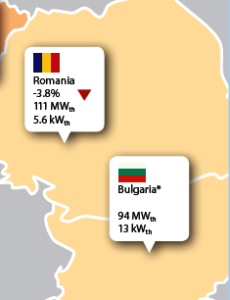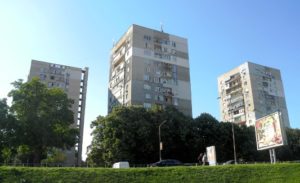When it comes to solar thermal energy, there are interesting parallels between Romania and its southern neighbour Bulgaria. Both countries had already used solar thermal energy under communist rule decades ago. But the ecological tradition seemed lost when both countries made their difficult transition to a democratic and capitalist society. According to a report by the European ENTRANZE passive house project, Romania ranked fifth in the number of globally installed flat plate collectors in 1989, but “the lack of technicians and of policies to develop maintenance services, as well as bad national resource efficiency policies (e.g., which led to copper being replaced by iron pipes in solar collectors) led to notable failures among installed systems.” The ENTRANZE authors note that these technical problems gave solar water heaters quite a negative image in Romania. It was only since the beginning of this millennium that they have been able to get rid of this image and “gain a certain popularity on the market”.
Various types of promotional programmes, especially over the last years, have supported energy efficiency measures and renewable energy investment projects in the country. “The European Bank of Reconstruction and Development (EBRD) implements a number of Sustainable Energy Finance Facilities (SEFFs) across the countries in which it operates, including in Romania and Bulgaria,” says Stefania Racolta-Cruceru, Principal Manager of the EBRD Energy Efficiency and Climate Change Team in London. Together with the European Union (EU), the EBRD offers two such finance facilities to Romanian private companies and one to municipal beneficiaries. They all include favourable loans financed by participating commercial banks, free technical consultations by Belgium consultancy Tractebel Engineering (which has an office in Romania) and EU grants, which do not need to be paid back (see further details in the table below).
Grants and loans for different commercial customer groups
“Among the hundreds of investment projects for renewable energy solutions and energy efficiency measures that we have so far financed in Romania, there have also been a few solar thermal investments,” says Racolta-Cruceru. She cites Com Sova as an example, the Romanian manufacturer of polystyrene sandwich panels and other components for thermal building insulation. The company, located in the Wallachian city of Buzău, received a EUR 1 million EBRD loan for its EUR 1.8 million investment. It financed not only the improvement of production processes, but also the installation of solar water heaters, which altogether helped save 26 % of the consumed energy.
The EU EBRD Energy Efficiency Finance Facility (EEFF) for industrial end users, a EUR 80 million fund, offers private manufactures the chance to invest in energy efficiency. Eligible borrowers can acquire loans of up to EUR 2.5 million EUR and EU grants of up to 375,000 EUR (covering 15 % of the respective investment). The EUR 60 million fund of the EU EBRD Romania SME Sustainable Energy Finance Facility (RoSEFF), on the other hand, is addressed to small and medium enterprises, housing associations and Energy Service Companies (ESCOs). It shows favourable loans of up to EUR 250,000 Euro for small and simple, but also EUR 1 million for large and complex energy-efficient investments, in addition to EU grants of up to 15 % of the eligible costs. The RoSEFF also offers expansion loans of up to EUR 1 million to manufacturers, suppliers and installers of sustainable energy products and services. Last but not least, there is the EU EBRD Municipal Finance Facility – Energy Efficiency (MFFEE): EUR 10 million for energy-efficient investment projects by municipal institutions or enterprises.
According to the latest data from Tractebel Engineering, 35 sustainable energy loans have been approved in the frame of RoSEFF. They range between EUR 40,000 and EUR 700,000, with a total value of EUR 10.5 million. 115 EEFF credits totalling EUR 68 million have been granted to various beneficiaries from the industrial sector. No MFFEE data is available at present.
More information:
The table below shows the frame conditions of the former EEFF programme.
|
Country / Region
|
Romania
|
|
Name of programme
|
Sustainable Energy Finance Facilities EEFF, RoSEFF & MFFEE
|
|
Type of incentive
|
Low-interest loans and grants for energy efficiency and renewable energy projects
|
|
Eligible technologies
|
Almost any kind of energy efficiency measures and renewable energy installations like solar thermal energy facilities
|
|
Applicable sectors
|
EEFF – Production companies
RoSEFF – Small and medium-sized enterprises (up to 250 employees and a turnover of EUR 50 million), housing associations and Energy Service Companies (Escos)
MFFEE – Municipal institutions and enterprises
|
|
Amount
|
EEFF – Up to EUR 2.5 million
RoSEFF – Minimum EUR 25,000, the maximum RoSEFF credit for small-scale and simple investments is EUR 250,000, for big and complex investments EUR 1 million.
MFFEE – not fixed
|
|
Maximum incentive
|
EU grants of up to 15% of the eligible costs
|
|
Requirements for system
|
According to the list of eligible measures and equipment (LEME)
|
|
Requirements for installation
|
Not specified
|
|
Finance provider
|
Banca Comerciala Romana (BCR)
BRD Groupe Societe Generale (BRD)
Banca Transilvania (BT)
Unicredit Tiriac Bank (Unicredit)
|
|
Total funds
|
EEFF – EUR 80 million
RoSEFF – EUR 60 million
MFFEE – EUR 10 million |
|
Funding sources
|
European Bank für Reconstruction and Development (EBRD) for loans / European Union (EU) for grants
|
|
Effective date
|
Since 2009
|
|
Expiration date
|
Not specified
|
|
Website
|
http://www.eeff.ro
http://www.seff.ro
|
|
Last review of this tabloid
|
July 2014
|
|
Contact
|
EEFF Information Service
Tractebel Engineering
EU/EBRD Energy Efficiency Finance Facility Office
Str. Alexandru Constantinescu 6
Bucharest
Romania
Ana-Maria Ivan
0040/ 31 224 8104
eeff@eeff.ro
|



